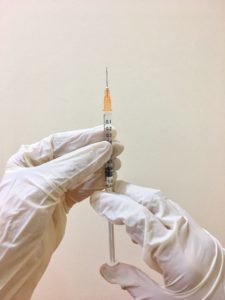ATLANTA, GA – April 18, 2023 – On April 18th, the FDA authorized an updated COVID-19 bivalent booster. The bivalent booster became available in September 2022 as an update from the originally recommended booster. A bivalent booster vaccine targets the original virus and the new variants originating from the omicron strain which appeared in late 2021. Only 17% of eligible persons have received the bivalent vaccine.
The CDC has updated their COVID-19 vaccine recommendations:
- Immunocompromised adults and persons 65 years and older who would like more protection are eligible for the updated bivalent COVID vaccine. These groups are at higher risk to getting severely ill and being hospitalized with COVID-19.
- The original COVID-19 vaccines are no longer available.
- One bivalent COVID-19 vaccine dose is recommended for everyone ages 6 and older to be considered up to date.
- Everyone 6 years and older can receive the new vaccine if they haven’t been vaccinated against COVID.
- The new vaccine is recommended for young children, ages 6 months to 5 years depending on their vaccination history
- Alternative vaccines, by Novavax and Johnson & Johnson, are available for people who are unable to take the new vaccine or prefer another type
The immunologic protection for the first bivalent booster loses its effectiveness against severe illness and hospitalization after 6 months for at-risk groups as determined by the FDA and the CDC, according to Dr. Peter Hotez, co-director of the Texas Children’s Hospital Center for Vaccine Development and Dean of the National School of Tropical Medicine at Baylor College of Medicine.
Respiratory viral infections, like COVID-19 and the flu, traditionally peak in the fall and winter months. The FDA will meet this summer to discuss which COVID and flu variants should be addressed in the Fall. The CDC has indicated that there may be more vaccine updates.
A person is eligible for the updated booster if he or she is:
- Ages 65 and older and had a booster at least 4 months ago
- Moderately or severely immunocompromised, age 6 years and older, and had a booster at least 2 months ago (as recommended by their doctor)
A person with a recent COVID infection will still need to stay up to date with the vaccine. The next vaccine dose should be delayed by 3 months from either the date that the symptoms started or when the first test was positive if there were no symptoms. However, a person may contact their physician about getting the vaccine sooner if he/she:
- Is at high risk of severe disease
- Is in close contact with an at-risk person, or
- Live in a community with a high transmission level or high community level
Dr. Peter Marks, the Director of the FDA’s Center for Biologics and Research, said in a statement on April 18th, “COVID-19 continues to be a very real risk for many people, and we encourage individuals to consider staying current with vaccination, including with a bivalent COVID-19 vaccine.”
Listen to the full report below:
Contact: Dr. Dick Needleman, Health reporter, 103.3 AshevilleFM, [email protected]
More Posts for Show: Asheville FM News Hour
